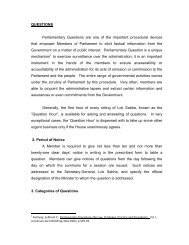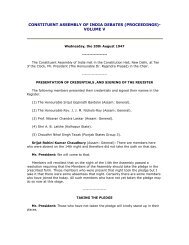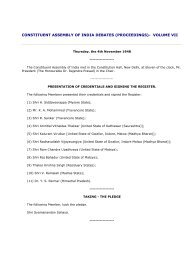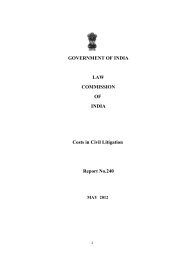gÉÉŌ A.]ÉŌ. xÉÉxÉÉ
gÉÉŌ A.]ÉŌ. xÉÉxÉÉ
gÉÉŌ A.]ÉŌ. xÉÉxÉÉ
Create successful ePaper yourself
Turn your PDF publications into a flip-book with our unique Google optimized e-Paper software.
03.08.2010<br />
what is happening to the salaried Government employees, who probably are about<br />
3-3.5 per cent of the population of this country. But once the report is out, the<br />
common man again, who has no fixed income, is strapped and is pounded down<br />
by the rising prices. The Federal Government here has consistently blamed the<br />
State Governments for not controlling the prices. But all of us here are aware that<br />
except for some disciplinary moves, some raids and some little control here and<br />
there, prices actually depend a lot on economic policies, on economic discipline.<br />
But unfortunately the Federal Government has completely ignored its own<br />
responsibilities and is trying to pass the buck to the State Governments, hoping<br />
that this will save its skin by this sort of an excuse.<br />
I may be criticized, but I am willing to admit that as a stand-alone case, just<br />
the increase in the petroleum prices is not the sole cause for all round rise in prices.<br />
Your faulty taxation practices, as was briefly mentioned by the Leader of the<br />
Opposition, have gone into the inflationary machine to increase its price. It has<br />
become fatter; the rise in the prices of petroleum products has definitely further<br />
fuelled this increase in prices. But on the other hand, the wrong policies being<br />
pursued since the 1990s until today, and I am not depriving the credit from either<br />
side – the side that represents the shopkeepers or the side that supports<br />
multinationals and businessmen.<br />
Both sides are today equally responsible for the plight that India is in.<br />
One example that I would like to state here, this Government in just one year, 365<br />
days, has actively helped in decreasing, by a whooping 8 per cent, the amount of<br />
land under cultivation in India; from 680.9900,000 hectares in 2008-09 to<br />
626.4700,000 hectares in 2009-10. This is a sad case and we are all aware that<br />
today when we go to our constituencies we do not see the youth of this country<br />
being interested in agriculture. The youth want to move to cities. Given a chance<br />
they would probably move to Mumbai, Delhi or Bangalore but they do not wish to<br />
live in villages. What is the reason? Have we ever tried to find out the reason?<br />
You talk about nuclear power, SEZ, seat in the UN, India becoming a world power,<br />
127


![gÉÉŌ A.]ÉŌ. xÉÉxÉÉ](https://img.yumpu.com/8015720/127/500x640/geeo-aeo-xeexee.jpg)













